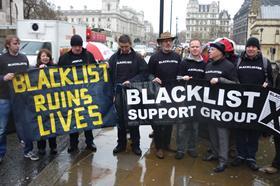Committee chair slams contractors’ behaviour as ‘callous and manipulative’

MPs have published a stinging report slamming the compensation scheme set up by eight contractors for the victims of blacklisting.
The Commons Scottish Affairs Committee has published its final report into ‘Blacklisting in Employment’ this morning.
The wide-ranging document is critical of contractors’ responses to blacklisting since it was uncovered in 2009.
The report also calls for a public inquiry into the blacklisting scandal.
In a statement accompanying the report, the chair of the committee Ian Davidson acknowledged the eight firms that had set up a compensation scheme - Balfour Beatty, Carillion, Costain, Kier, Laing O’Rourke, Sir Robert McAlpine, Skanska UK and Vinci - had made an “effort”, but criticised their “unilateral introducation” of the scheme without victim and union support as an “act of bad faith”.
He also said the contractors had been “callous and manipulative” by “implying that the trade unions were in agreement with the scheme”.
A spokesperson for the scheme said it welcomed “the report’s recognition that they are the only companies in the industry that have taken any steps to apologise for their historic involvement” in blacklisting.
The spokesperson said the scheme offered a “faster and less stressful process than a court case”, with potential compensation awards between £4,000 and £100,000, and the contractors remained “fully committed to the scheme”, saying it had received more than 480 enquiries, 233 eligible applications and had compensated 149 people.
Victims of blacklisting are currently bringing a class action against contractors in the High Court.
The spokesperson added: “We were disappointed that that the launch of TCWCS was not supported by the unions; we note that the final report references our engagement with the unions prior to the launch and recognises key changes were made to the scheme as a result of these conversations.
“We strongly refute any suggestion that we had attempted to mislead any of our audiences or conceal the outcome of our discussions with the unions. That said, we wrote to MPs in July 2014 apologising for any ambiguity our original letter may have created.
Each of the eight companies involved in TCWCS is determined to ensure this issue stays in the past and would comply fully with any code of conduct - either statutory or voluntary - that may be introduced to this end.”
More to follow…
Full statement by Ian Davidson, chair of the Scottish Affairs Committee
“The unilateral introduction of a compensation scheme was an act of bad faith by those involved, likely to be motivated by a desire to minimise financial and reputational damage rather than being a genuine attempt to address the crimes of the past.
“To mislead MPs is a serious issue but to mislead blacklisted workers and their families by implying that the trade unions were in agreement with the scheme is both callous and manipulative.
“While we are highly critical of the scheme and the way it was introduced, at least those eight companies have made even this effort. We do not accept the excuses made from the other companies for their non-participation and interpret this as evidence of their unwillingness to self-cleanse.
“Despite the grave flaws in the scheme, our main concern is that the victims of blacklisting receive at least some measure of compensation. The ICO should redouble its efforts to find and contact as many of the individuals whose names who were on the original TCA list as possible-including the families of those blacklisted workers who may have passed away.
“Given the denial and duplicitous practices we have encountered on the part of many of the companies who were complicit in blacklisting, we have no confidence in the sector to either self-cleanse on a voluntary basis nor to take sufficiently robust steps to eradicate the practice of blacklisting in the future. A voluntary code of conduct for pre-employment vetting in the construction company will not be sufficient. We must have a statutory with those firms who have refused to self-cleanse being banned from all contracts funded, in whole or in part, by public money code of practice.
“Despite the progress and positive steps which have been taken during the course of our inquiry, in this final report we have identified that many questions in relation to the practice of blacklisting remain unanswered, including the recent allegations in relation to police and security service involvement in blacklisting in the construction and other sectors. We are specifically concerned as to whether the extent and breadth of the practice is fully known, and whether this odious practice is ongoing within the construction industry. We are convinced that the only way to fully answer these questions is through a full Public Inquiry and we recommend that the Government take immediate steps to launch one.”



























No comments yet